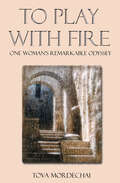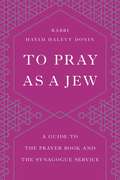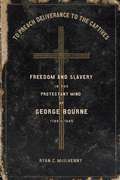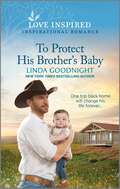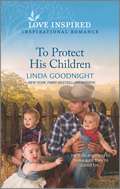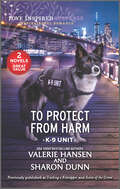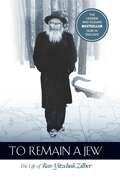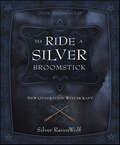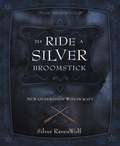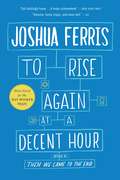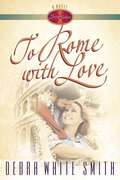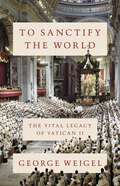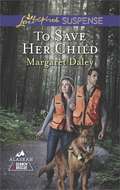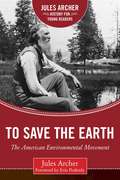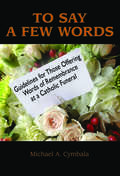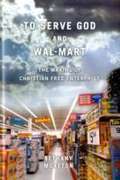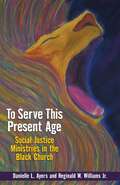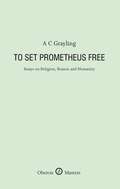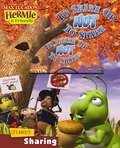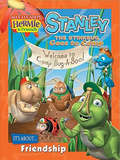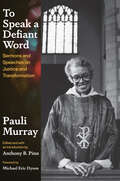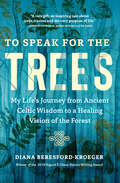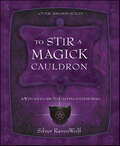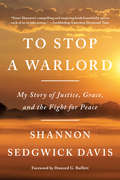- Table View
- List View
To Play With Fire: One Woman's Remarkable Odyssey
by Tova MordechaiHow does Tonica Marlow, an evangelical female minister, find her way to becoming Tova Mordechai, an Orthodox, practicing Jew? Born the daughter of an Egyptian Jewish mother and a British Protestant evangelical father, Mordechai presents the powerful real-life account of her tumultuous journey to Judaism as she grapples with Christianity and her Jewish roots.
To Pray as a Jew: A Guide to the Prayer Book and the Synagogue Service
by Hayim H. DoninA distinguished guide to Jewish prayerWhy do Jews pray? What is the role of prayer in their lives as moral and ethical beings? From the simplest details of how to comport oneself on entering a synagogue to the most profound and moving comments on the prayers themselves, Rabbi Hayim Halevy Donin guides readers of To Pray as a Jew through the entire prescribed course of Jewish liturgy, passage by passage, ritual by ritual, in this handsome and indispensable guide to Jewish prayer. Unexcelled for beginners as well as the religiously observant, To Pray as a Jew is intended to show the way, to enlighten, and hopefully to inspire.
To Preach Deliverance to the Captives: Freedom and Slavery in the Protestant Mind of George Bourne, 1780–1845
by Ryan McIlhennyGeorge Bourne was one of the early American republic’s first immediate abolitionists, an influential figure who paved the way for the campaign against slavery in the antebellum period. His approach to reform was shaped by a conservative Protestant outlook that became increasingly hostile to Catholicism. In To Preach Deliverance to the Captives, Ryan C. McIlhenny examines the interplay of Bourne’s pioneering efforts in abolitionism and his intensely anti-Catholic views. McIlhenny portrays Bourne as both a radical and a conservative, a reformer who desired to get back to the roots of Christianity for the purpose of completely dismantling slavery. Bourne’s commentary on a variety of controversial topics—slavery, race, and citizenship; the role of women; Christianity and republicanism; the importance of the Bible; and the place of the church in civil society—put him at the center of many debates. He remains a complex figure: a polymath situated within the political, social, and cultural possibilities of an early republic that he was eager to play a part in shaping. Bourne’s religious radicalism gave rise to his hope for an emerging post-revolutionary republic that would focus mainly on its religious foundations. The strength of the American nation, in Bourne’s mind, rested not only on institutions indicative of a republican form of government but also on a pure Christianity, exemplified best in historical Protestantism. To Bourne, the future of the fledgling nation depended not only on principles and institutions but also on the activism of Protestant leaders like himself.
To Protect His Brother's Baby: An Uplifting Inspirational Romance (Sundown Valley #6)
by Linda GoodnightA stranger in his house… Could be the family he never knew he needed After he spent six months on the road, the last thing cowboy Wilder Littlefield expects to come home to is a pregnant woman living on his ranch. Taylor Matheson not only believes the house is hers, but she&’s carrying his estranged late brother&’s child. Tied together by blood, Wilder lets Taylor stay as his housekeeper. But as they learn how to be a family, could obligation turn to love? From Love Inspired: Uplifting stories of faith, forgiveness and hope.Sundown Valley Book 1: To Protect His ChildrenBook 2: Keeping Them SafeBook 3: The Cowboy's Journey HomeBook 4: Her Secret SonBook 5: The Rancher's SanctuaryBook 6: To Protect His Brother's Baby
To Protect His Children (Sundown Valley #1)
by Linda GoodnightHe’ll do anything to make sure they’re cared for…from New York Times bestselling author Linda Goodnight.He finally found a nanny…but can he convince her to stay?After a tragedy, rancher Wade Trudeau’s offer of a summer housekeeping position at Sundown Ranch is the perfect cure for former teacher Kyra Mason. Only Wade left out an important part of her job—looking after his triplets! Now Kyra’s falling for the three adorable toddlers, along with their love-shy cowboy dad. But when summer ends, can Kyra return to real life…knowing she’s left her heart behind?From Harlequin Love Inspired: Uplifting stories of faith, forgiveness and hope.Sundown ValleyBook 1: To Protect His Children
To Protect from Harm (K-9 Unit)
by Valerie Hansen Sharon DunnTarget of a killer…Tracking a Kidnapper by Valerie Hansen Thwarting a kidnapping has thrust Officer Vivienne Armstrong and her K-9 partner, Hank, right into the culprit&’s crosshairs. Now, even with danger stalking them at every turn, Vivienne refuses to stop working, but FBI agent Caleb Black intends to do his job and safeguard her. Together, can they stop the would-be kidnapper from striking a final, fatal blow?Scene of the Crime by Sharon Dunn Evidence from forensic specialist Darcy Fields could convict a killer—if she survives to testify. A killer seems determined to discredit her, frighten her…and silence her, permanently. Hounded by the press and stalked by a murderer, Darcy must depend on Officer Jackson Davison and his K-9 partner, Smokey, as danger inches nearer and the trial date closes in.USA TODAY Bestselling Authors Valerie Hansen and Sharon Dunn Previously published as Tracking a Kidnapper and Scene of the Crime
To Remain a Jew: The Life of Rav Yitzchak Zilber
by Rabbi Zilber BentzionIn the biting, forbidding winds of Communist Russia, one man staunchly refused to submit. Not through terrible imprisonment, and not under the threat of mortal peril. In this magnificent story, Rav Yitzchak Zilber's devotion and sacrifice for Torah Judaism under oppression shines through in the bleakness of what was. The "father" to countless unfortunate Jews in the Soviety Union and Eretz Yisrael, and an extraordinary figure in the kiruv movement in Eretz Yisrael and in the Diaspora, Rav Yitzchok was renowned for standing up for his beliefs and encouraging hundreds of others to do the same. With photographs, anecdotes, and a compelling tone, this autobiography, comprised of accounts Rav Zilber told during his lifetime, this is truly an uplifting read. Translated from the original Russian and Hebrew editions.
To Ride a Silver Broomstick: New Generation Witchcraft
by Silver RavenWolfThis popular guide has been helping a new generation of Witches—those practicing or wishing to practice the Craft on their own—for decades. Summon. Scry. Spin, spiral, and sweep. Learn how to bend time, draw down the moon’s energy, and use mirror magick. Whether novice or adept, a Witch’s world is filled with wonder and magick. It’s also filled with the hard work and dedication to learning that are part of living the Craft every day. Silver RavenWolf presents a fascinating introduction to the Craft in To Ride a Silver Broomstick, the first volume in the tremendously popular Witchcraft series that also includes To Stir a Magick Cauldron and To Light a Sacred Flame. This indispensable guide presents tried-and-true Witch wisdom, dished out with Silver’s down to earth warmth and humor. You’ll learn the essentials of Witchcraft, including: WebweavingAural projection, bilocation, and power animalsStocking your magickal cabinetCleaning, consecrating, and chargingThe Summerland death, reincarnation, and timeFinding your magickal nameHealing techniquesDeities and pantheonTelepathy, psychometry, and mind powerThe Wheel of the YearGems, herbs, and healingColor, candle, and sympathetic magick
To Ride a Silver Broomstick: New Generation Witchcraft
by Silver RavenwolfThis is an introductory text on the study and practice of Wicca. It comes from an eclectic background and is suitable for men and women. It is a respectful and straightforward approach to the religion of witchcraft.
To Rise Again at a Decent Hour: A Novel
by Joshua FerrisA big, brilliant, profoundly observed novel about the mysteries of modern life by National Book Award Finalist Joshua Ferris, one of the most exciting voices of his generation Paul O'Rourke is a man made of contradictions: he loves the world, but doesn't know how to live in it. He's a Luddite addicted to his iPhone, a dentist with a nicotine habit, a rabid Red Sox fan devastated by their victories, and an atheist not quite willing to let go of God. Then someone begins to impersonate Paul online, and he watches in horror as a website, a Facebook page, and a Twitter account are created in his name. What begins as an outrageous violation of his privacy soon becomes something more soul-frightening: the possibility that the online "Paul" might be a better version of the real thing. As Paul's quest to learn why his identity has been stolen deepens, he is forced to confront his troubled past and his uncertain future in a life disturbingly split between the real and the virtual. At once laugh-out-loud funny about the absurdities of the modern world, and indelibly profound about the eternal questions of the meaning of life, love and truth, TO RISE AGAIN AT A DECENT HOUR is a deeply moving and constantly surprising tour de force.
To Rome With Love (Seven Sisters Series Book #4)
by Debra White SmithMelissa gazed into velvet brown eyes. Kinkaide hadn't changed much in six years. His expressive eyes and vibrant smile brought back memories and images of a time filled with promise and love... at time she thought would last forever. Melissa stepped back. Nothing could break through the barriers surrounding her heart...nothing (note the..."nothing" And now Kinkaide was standing before her, believing she had accepted his invitation for a Mediterranean excursion. He held out a note signed with her name...a note she had never seen before. Shock slowly softened to interest. Despite his broken promises, hope stirred. What if... A captivating tale of romance and suspense
To Sanctify the World: The Vital Legacy of Vatican II
by George WeigelA leading Catholic intellectual explains why the teachings of the Second Vatican Council are essential to the Church's future—and the world'sThe Second Vatican Council (1962–1965) was the most important Catholic event in the past five hundred years. Yet sixty years after its opening on October 11, 1962, its meaning remains sharply contested and its promise unfulfilled.In To Sanctify the World, George Weigel explains the necessity of Vatican II and explores the continuing relevance of its teaching in a world seeking a deeper experience of freedom than personal willfulness. The Council&’s texts are also a critical resource for the Catholic Church as it lives out its original, Christ-centered evangelical purpose.Written with insight and verve, To Sanctify the World recovers the true meaning of Vatican II as the template for a Catholicism that can propose a path toward genuine human dignity and social solidarity.
To Save Her Child
by Margaret DaleyIn Search of Her Son When a young boy goes missing from wilderness day camp, Alaskan search and rescue worker Josiah Witherspoon is on the case. The brooding ex-marine promises to find the child and return him to his worried mother. But he doesn't know that Ella Jackson has a secret past. One that could put them all in danger. When tensions mount, Ella needs to tell Josiah the truth-but she can't set aside her fears enough to trust him. Ella and Josiah are ready to risk their lives to save her son, but will they risk their hearts, as well? Alaskan Search and Rescue: Risking their lives to save the day
To Save the Earth: The American Environmental Movement (Jules Archer History for Young Readers)
by Jules Archer Erin PeabodyWith today's climate change, our environmental problems aren’t going away any time soon.To Save the Earth looks at the lives of four extraordinary Americans who fought to save our earth. John Muir, a pioneer of conservationism, was the founder of our national park system. Rachel Carson, biologist and author, educated our country about the effects of pesticides and chemical waste. David McTaggart, the organizer of Greenpeace, introduced nonviolent protest into the struggle, while Dave Foreman, cofounder and former leader of the activist group Earth First!, shook up a movement that had grown complacent.The biographies of each of these figures, as well as personal interviews with David McTaggart and Dave Foreman, help us to understand the environmental movement specific to the United States. With current issues of excessive pollution and climate change, this is an excellent resource for introducing young readers to the cause. Upon first publication, To Save the Earth was chosen as a Junior Library Guild Selection, and now, this fascinating and important book is back in print to teach a whole new generation of readers the importance of environmental conservation and preservation.
To Say a Few Words: Guidelines for Those Offering Words of Remembrance at a Catholic Funeral
by Michael A. CymbalaThis little booklet is designed for anyone who faces the difficult and important task of offering words of remembrance at a Catholic Funeral. Both experienced and inexperienced speakers will benefit from this easy-to-read resource. It offers a simple, practical, and--most importantly--discreet way of informing anyone asked "to say a few words" at a Catholic service on the rules that are involved, while also offering practical advice on how to deliver the remarks in an artful and respectful manner. The Catholic Church's policies on the use of family-designated speakers at funerals, wakes, and memorial services and the importance of their putting their remarks in a Christian context are both directly and politely addressed. The booklet emphasizes the sacred elements of the occasion, offering speakers the opportunity to understand their role as something more serious than a toastmaster or even a comedian. Practical suggestions abound on how to form and deliver a concise and appropriate address well suited to a religious gathering. Three sample sets of remarks are included to give speakers a sense of what is possible and appropriate in different situations and venues. This booklet is also available as an e-book for those who are traveling or otherwise not available to obtain a printed copy in time to prepare their remarks.
To Serve God and Wal-Mart: The Making of Christian Free Enterprise
by Bethany MoretonThis extraordinary biography of Wal-Mart’s world shows how a Christian pro-business movement grew from the bottom up as well as the top down, bolstering an economic vision that sanctifies corporate globalization. The author has assigned her royalties and subsidiary earnings to Interfaith Worker Justice (www.iwj.org) and its local affiliate in Athens, GA, the Economic Justice Coalition (www.econjustice.org).
To Serve This Present Age: Social Justice Ministries in the Black Church
by Danielle L. AyersThe African American church has a charge to keep. KEY FEATURES: - Reviews the history of the black churchs social justice contributions and leadership - Establishes todays need for justice ministries in the congregation and community - Spotlights real-life ministries and initiatives - Provides sample training manual materials At a time when the African American church is increasingly associated with the controversial prosperity gospel, pastors Danielle Ayers and Reginald Williams remind black church leaders of the prophetic call to do justice. Exploring first the biblical foundations for justice work that goes beyond charity, the authors also recall the storied history of the black churchs leadership in the Civil Rights Movement. From there, this practical resource establishes the contemporary need for justice ministries in the congregation and the community. From initiatives of care and education to programs of action and collaboration, discover the transforming impact the church can have on society, culture, and community through diverse social justice ministries. Features Spotlights on real-life ministries and initiatives, common justice issues, and a resource guide to assist in the creation and sustaining of ministries of justice.
To Set Prometheus Free: Essays On Religion, Reason And Humanity (Oberon Masters Series)
by A. C. GraylingIn 2007 Anthony Grayling wrote Against All Gods, a collection of polemical essays attacking religion. Now in To Set Prometheus Free he develops those themes more comprehensively, unpicking the claims and arguments of religious apologists, summarising the views of his fellow secularist (Bertrand Russell in particular detailing the controversy over 'Intelligent Design' and outlining his personal, naturalistic world-view. <P><P> He robustly calls for humanity to choose deliverance from religion because, as he puts it, 'large portions of mankind remain in some degree in thrall to myths dating from an ignorant and illiterate past.'
To Share or Nut To Share (Max Lucado's Hermie & Friends #7)
by Max Lucado.The garden literally goes "nuts" when a shortage of nuts causes panic, especially with the Garden Talent Show & Tell starting tomorrow. And wouldn't you know it--everyone's talent involves a nut. With only one nut left in the entire garden, friends turn into enemies as it's a mad dash to see who grabs the last, elusive nut. To remain friends and to save the show, the bugs must learn to share.
To Share or Nut to Share (Max Lucado's Hermie & Friends)
by Max LucadoThere's someone new coming to the garden's Summer Camp this year, and, well, he has a problem. He stinks. But that's what stink bugs do. So, when Stanley arrives at Camp-Bug-a-Boo, he creates quite a...well, stink. Everyone tries their best to put up with the unusual odor, but things don't go so well. But then God helps the summer camp to realize that the reason Stanley stinks is because he's afraid and the thing he is most afraid of is others not liking him and accepting him the way he is. Our garden friends soon learn that God created each of us for very special reasons and that, even though Stanley is different, they need to show him love.
To Shine One Corner of the World
by David ChadwickParaphrased from the book cover: Shunryu Suzuki has an extraordinary gift for bringing to life traditional Zen teaching in ordinary language. Here we see how his students saw him and what they remember that stayed with them when more elaborate discussions did not. He managed to put seemingly complicated ideas in short, simply statements that contained depths of understanding and compassion and often tinged with a lovely sense of humor.
To Speak a Defiant Word: Sermons and Speeches on Justice and Transformation
by Pauli MurrayTwenty-five years of writings by the religious thinker and activist Pauli Murray The religious thought and activism that shaped the late twentieth century is typically described in terms of Black men from the major Black denominations, a depiction that fails to account for the voices of those who not only challenged racism but also forced a confrontation with class and gender. Of these overlooked voices, none is more important than that of Pauli Murray (1910–1985), the nonbinary Black lawyer, activist, poet, and Episcopal priest who influenced such icons as Ruth Bader Ginsburg and Thurgood Marshall. Anthony B. Pinn has collected Murray&’s most important sermons, lectures, and speeches from 1960 through 1985, showcasing her religious thought and activism as well as her original and compassionate literary voice. In highlighting major themes in Murray&’s writing—including the strength and rights of women, faithfulness, religious community, and suffering—Pinn&’s collection reveals the evolution in Murray&’s religious ideas and her sense of ministry, unpacking her role in a tumultuous period of American history, as well as her thriving legacy.
To Speak for the Trees: My Life's Journey from Ancient Celtic Wisdom to a Healing Vision of the Forest
by Diana Beresford-Kroeger&“A rare gift: an inspiring tale about trees, trauma and the very purpose of life.&” —Andrew Nikiforuk, author of Empire of the Beetle Diana Beresford-Kroeger—a world-recognized botanist and medical biochemist—has revolutionized our understanding of the natural world with her startling insights into the hidden life of trees. In this riveting memoir, she uncovers the roots of her discoveries in her extraordinary childhood in Ireland. Soon after, her brilliant mind bloomed into an illustrious scientific career that melds the intricacies of the natural world with the truths of traditional Celtic wisdom. To Speak for the Trees uniquely blends the story of Beresford-Kroeger&’s incredible life and her outstanding achievement as a scientist. It elegantly shows us how forests can not only heal us as people but can also help save the planet.
To Stir a Magick Cauldron: A Witch's Guide to Casting and Conjuring
by Silver RavenWolfA comprehensive guide to the essentials of Witchcraft, now revised and updated.Cast. Conjure. Stir it up. Call on assistance of the five winds, cast a circle of stars, enlist the help of the nature spirits in your yard. A Witch’s world is filled with wonder and magick. It’s also filled with the hard work and dedication to learning that are part of living the Craft every day.SilverRavenWolf serves up seasoned guidance to the Craft in To Stir A Magick Cauldron, the second volume in the enormously popular Witchcraft series that also includes To Ride A Silver Broomstick and To Light A Sacred Flame. Let Silver help you rediscover the divine within the natural world, and teach you the spiritual and magickal practices needed to enjoy all that bountiful Universe has to offer. The indispensable guide presents tried-and-true Witch wisdom, dished out with Silver’s down-to-earth warmth and humor. You’ll learn the essentials of Witchcraft, including:· cauldron magick · meditations and practices for spiritual balance· the Robe of Stars ritual · the energetic importance of joy and laughter· The Dragon’s Loop and other protection spells · banishing rituals· circle casting · healing techniques · ten ways to raise power· land blessings · how to erect a shrine · trance work instruction· how to work with sun, moon, and star power · the Shrouded Supper ritual· elemental, herb, tarot, talismanic, and ritual magick
To Stop a Warlord: My Story of Justice, Grace, and the Fight for Peace
by Shannon Sedgwick DavisOne woman’s inspiring true story of an unlikely alliance to stop the atrocities of a warlord, proving that there is no limit to what we can do, even in the face of unspeakable injustice and impossible odds“This compelling and inspiring book beautifully moves each of us to take action to help the most vulnerable among us.”—Archbishop Emeritus Desmond Tutu Late one night in the summer of 2010, Shannon Sedgwick Davis, a lawyer, human rights advocate, and Texas mom to two young boys, first met a Ugandan general to discuss an unconventional plan to stop Joseph Kony, a murderous warlord who’d terrorized communities in four countries across Central and East Africa. For twenty-five years, Kony and his Lord’s Resistance Army had killed over a hundred thousand people, displaced millions, and abducted tens of thousands of children, forcing them to become child soldiers. After Sedgwick Davis met with survivors and community leaders, aid workers and lawmakers, it was clear that the current international systems were failing to protect the most vulnerable. Guided by the strength of her beliefs and convictions, Sedgwick Davis knew she had to help other parents to have the same right she had—to go to sleep each night knowing that their children were safe. But Sedgwick Davis had no roadmap for how to stop a violent armed group. She would soon step far outside the bounds of traditional philanthropy and activism and partner her human rights organization, the Bridgeway Foundation, with a South African private military contractor and a specialized unit within the Ugandan army. The experience would bring her to question everything she had previously believed about her role as a humanitarian, about the meaning of justice, and about the very nature of good and evil. In To Stop a Warlord, Shannon Sedgwick Davis tells the story, for the first time, of the unprecedented collaboration she helped build with the aim of finally ending Joseph Kony’s war—and the unforgettable journey on an unexpected path to peace. A powerful memoir that reads like a thriller, this is a story that asks us just how hard we would fight for what we believe in. 100 percent of the author’s net proceeds from this book will go to organizations seeking justice and protection for civilians in conflict zones.“This is an extraordinary memoir by an extraordinary leader—it’s impossible to read without feeling moved to do more to help those with less.”—Adam Grant, New York Times bestselling author of Originals and Give and Take
